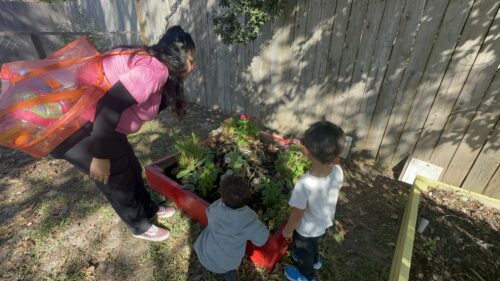
In today’s screen-dominated world, children spend less time outdoors than ever, missing out on essential physical, cognitive, and social-emotional growth opportunities. This shift has led to an alarming increase in issues like childhood obesity, attention difficulties, and social isolation.
The lack of outdoor play has left children disconnected from nature and its developmental benefits. The solution? Embracing nature play.
Here’s how nature play supports childhood development across various dimensions, providing actionable tips for parents, educators, and caregivers.
Outdoor activities naturally engage children’s bodies, developing gross and fine motor skills. Running, climbing, jumping, and balancing are integral to a child’s physical development, building strength, coordination, and overall fitness.
Unlike indoor play, nature play encourages full-body movement, allowing children to interact dynamically with their environment. Parents and educators can enrich outdoor spaces with safe, stimulating features. For instance, incorporating climbing structures, small obstacle courses, or jungle gyms in playgrounds or backyards motivates kids to move.
The outdoors is a natural classroom, rich in sensory stimuli that foster curiosity and problem-solving. When children engage with varied textures, colors, sounds, and scents, they stimulate sensory perception and enhance early cognitive development.
Unstructured play in nature often leads to imaginative scenarios, such as building forts with sticks or creating games with rocks and leaves. These activities encourage creativity, cognitive flexibility, and focus. Children learn to observe details and extend their attention spans while exploring.
Nature play also supports scientific thinking. For instance, kids playing with sand, water, and mud discover basic concepts like absorption, flow, and textures. Introducing sand and water tables in outdoor spaces allows children to experiment safely while fostering inquiry-based learning.
Social events provide unique opportunities for children to experience outdoor play while developing critical social and emotional skills. Whether attending birthday parties, weddings, or community gatherings, these occasions offer a blend of unstructured play and meaningful interactions, fostering growth in diverse and enriching settings.
Outdoor birthday parties are a natural space for children to practice social skills like sharing, cooperation, and communication. Scavenger hunts, relay races, or group games encourage teamwork and problem-solving. The open environment allows children to mingle with peers, explore freely, and develop confidence in social settings.
Parents can enhance the experience by incorporating nature-inspired elements into party themes—think nature-themed crafts, treasure hunts with natural objects, or even mini gardening sessions.
Events such as neighborhood block parties, farmers’ markets, or local festivals provide rich opportunities for children to interact with peers and adults in a broader community context. These gatherings often feature outdoor spaces with diverse play options, from bouncy houses to nature trails, creating a blend of structured and unstructured activities.
Nature offers endless possibilities for creativity by encouraging open-ended play. Unlike structured indoor activities, nature play invites children to invent games and explore their surroundings without fixed rules.
Gardening is a powerful way to nurture creativity in children, offering hands-on opportunities to design, grow, and care for living things. Incorporating tools like weed control and soil stability cloth can make gardening more accessible and engaging by ensuring tidy, manageable spaces for planting. This material keeps weeds at bay and stabilizes the soil, creating a sturdy foundation for young gardeners to experiment with layouts, plant arrangements, and decorative elements. Through tasks like selecting seeds, arranging flowerbeds, or tending to their mini garden, children develop problem-solving skills and a sense of accomplishment while exploring the beauty of nature.
Also, collecting natural materials like rocks, leaves, or flowers can inspire art projects or imaginative scenarios that provide additional opportunities for sensory engagement. Parents can involve children in simple tasks like decorating or setting up games, fostering creativity and cooperation.
Caregivers can design outdoor spaces with versatile materials, such as sandboxes, loose rocks, and child-friendly gardening tools to stimulate creativity. These elements encourage children to experiment and innovate, laying a foundation for lifelong curiosity and resourcefulness.
Incorporating elements of STEAM (Science, Technology, Engineering, Arts, and Mathematics) into outdoor play can enrich children’s experiences, blending traditional exploration with modern learning. For instance, introducing tools like child-friendly magnifying glasses or weather measurement kits allows kids to engage in scientific observation while outdoors.
Gardening projects provide a natural entry point for STEAM education. Children can learn about biology by planting seeds and observing growth or explore mathematics by measuring plant heights. Apps designed for young learners can complement these activities, helping children identify plant species or track weather patterns.
By combining nature play with STEAM principles, parents and educators can cultivate critical thinking skills and technological literacy while maintaining the benefits of outdoor exploration.
One of the most profound impacts of outdoor play is fostering a connection to the environment. Early exposure to nature helps children develop empathy for the natural world, encouraging them to become responsible stewards of the planet.
Gardening activities are a hands-on way to teach environmental principles. Involving children in planting seeds, watering flowers, and pulling weeds introduces them to sustainability concepts like life cycles and resource conservation. Designating a small garden space for kids empowers them to take ownership of these tasks, building patience, mindfulness, and a sense of accomplishment.
Outdoor exploration also lays the groundwork for environmental activism. As children grow, their early experiences in nature can inspire them to advocate for greener practices and policies. Parents and educators ensure that the next generation values and protects the environment by fostering a love for the outdoors.
Nature play is more than just fun—it’s a vital component of childhood development. By encouraging physical activity, cognitive growth, social interaction, emotional resilience, and creativity, outdoor play sets the foundation for well-rounded individuals.
In a world increasingly dominated by screens and structured activities, nature play offers a refreshing antidote. It reconnects children with the outdoors, inspiring curiosity, confidence, and a lifelong appreciation for the beauty of the natural world.
#Preschool #Outdooractivities #Houston #Education #Childcare
Traits of effective teachers